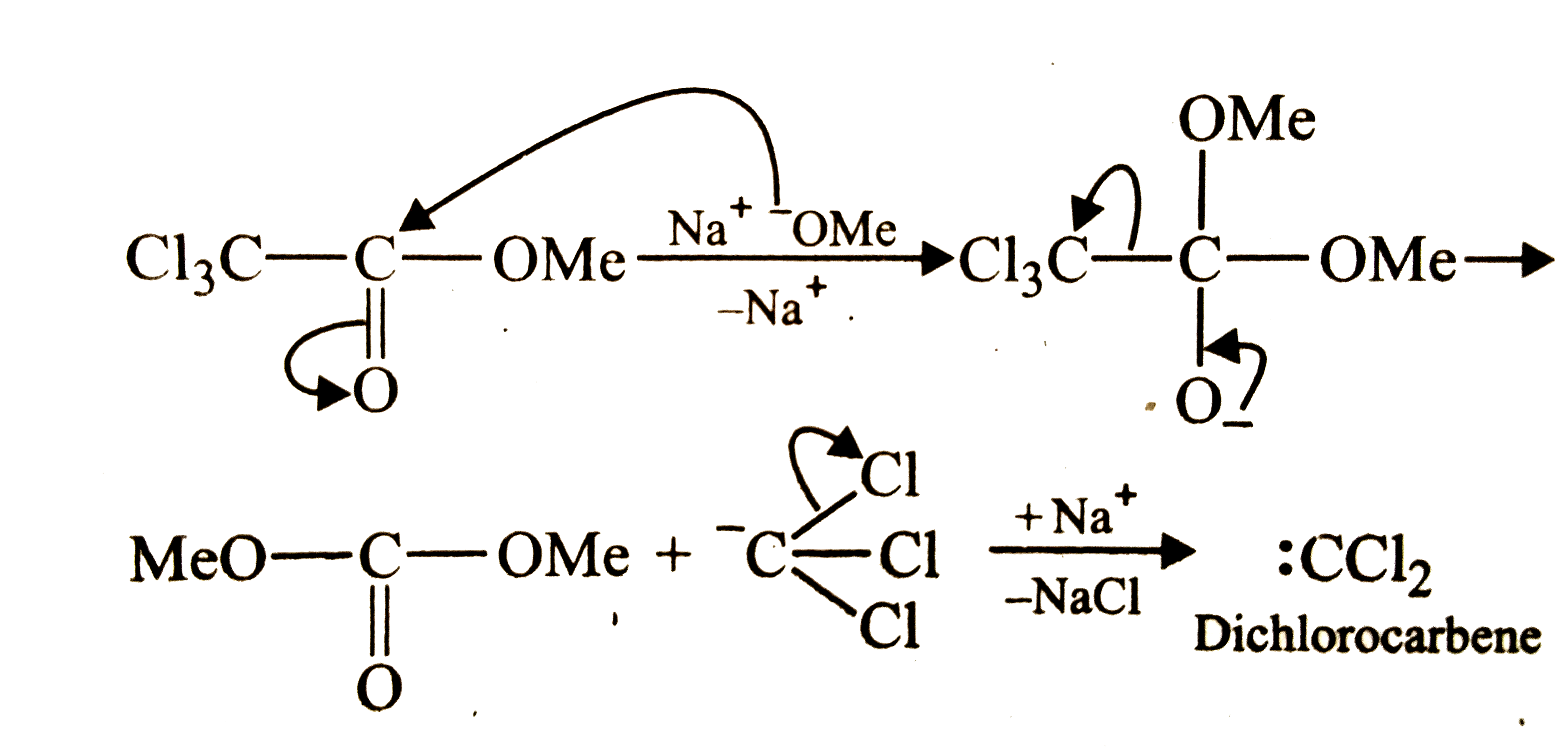The reaction of methyl trichloroacetate (Cl3CCO2Me) with sodium methoxide (NaOMe) generates :
A
carbocation
B
carbene
C
carbanion
D
carbon radical
Video Solution
Text Solution
The correct Answer is:B
A carbene, i.e., dichlorocarbene is generated according to the following mechanism.

|
Topper's Solved these Questions
- ORGANIC CHEMISTRY-SOME BASIC PRINCIPLES TECHNIQUESBOOK - PRADEEPCHAPTER - ORGANIC CHEMISTRY-SOME BASIC PRINCIPLES TECHNIQUESEXERCISE - Competition Focus (Jee (Main and Advanced)/Medical Entrance) II. Multiple Choice Questions (with one or more than one correct answers)
8 Videos
- ORGANIC CHEMISTRY-SOME BASIC PRINCIPLES TECHNIQUESBOOK - PRADEEPCHAPTER - ORGANIC CHEMISTRY-SOME BASIC PRINCIPLES TECHNIQUESEXERCISE - Competition Focus (Jee (Main and Advanced)/Medical Entrance) III. Multiple Choice Questions (Comprehension)
12 Videos
- ORGANIC CHEMISTRY-SOME BASIC PRINCIPLES TECHNIQUESBOOK - PRADEEPCHAPTER - ORGANIC CHEMISTRY-SOME BASIC PRINCIPLES TECHNIQUESEXERCISE - Analytical Questions and Problems with Answers/Solutions (Problems)
4 Videos
- HYDROGEN BOOK - PRADEEPCHAPTER - HYDROGEN EXERCISE - COMPETITION FOCUS (Assertion-Reason Type Questions) Type 2
15 Videos
- P-BLOCK ELEMENTS (NITROGEN FAMILY)BOOK - PRADEEPCHAPTER - P-BLOCK ELEMENTS (NITROGEN FAMILY)EXERCISE - Competition focus jee(main and advanced)/ medical entrance special) (VIII. Assertion-Reason Type Questions)
10 Videos
Similar Questions
Knowledge Check
The reaction of methyl trichloroacetate (Cl3CCO2Me) with sodium methoxide (NaOMe) generates :
AcarbocationBcarbeneCcarbanionDcarbon radicalThe reaction of methyltrichloroacetate (Cl3CCO2Me) with sodium methoxde (NaOMe) generates
AcarbocationBcarbeneCcarbenionDcarbon radicalThe SN2 reaction of 1-chloro-3-methylbutane with sodium methoxide is relatively slow , but can be accelerated by the addition of a small amount of Nal . How is this catalysis best explained ?
AThe sodium cation helps pull off the chloride anionBThe iodide anion activates the methoxide nucleophileCSN2 reaction of iodide ioc converts the alkyl chloride to the more reactive alkyl iodideDThe Nal changes the mechanism to SN1
Reaction of t−butyl bromide with sodium methoxide produces
View SolutionThe reaction of ethyl methyl ketone with Cl2/excessOH− gives the following major product
View SolutionAssertion. t-Butyl Methyl ether is not prepared by the reaction of t−butyl bromide with sodium methoxide.
Reason: Sodium methoxide is a strong nucleophile.
View SolutionReaction of t−butyl bromide with sodium methoxide produces
View SolutionAssertion. t-Buty1 Methyl ether is not prepared by rthe reaction of t−buty1 bromide with sodium methoxide.
Reason: Sodium methoxide is a strong nucleophile.
View Solution
